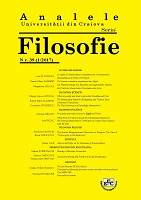THE RELATIONSHIP BETWEEN INTELLIGIBILITY AND TRUTH IN BASIC ARITHMETIC PROPOSITIONS
THE RELATIONSHIP BETWEEN INTELLIGIBILITY AND TRUTH IN BASIC ARITHMETIC PROPOSITIONS
Author(s): Robert Elliott AllinsonSubject(s): Logic, Ethics / Practical Philosophy, Philosophy of Science
Published by: Editura Universitaria Craiova
Keywords: Understanding; intuition; truth;
Summary/Abstract: The argument of this paper is that truth and intelligibility are codependent in basic arithmetic propositions. A basic arithmetic proposition (bp)2 may be defined as an arithmetic proposition that is so simple that it can both be understood and seen to be true upon simple inspection. An example of a basic arithmetic proposition is 1 + 3 = 4. For the mathematically adroit, a more complex arithmetic proposition or mathematical equation may be, for that subject knower, a basic arithmetic proposition. In order to understand a basic arithmetic proposition (bap) one must see it as true. In order to see a bap as true, one must understand it. The validity of the arguments in this paper is independent of any particular philosophy of arithmetic one adopts (logicist, formalist, intuitionist).
Journal: ANALELE UNIVERSITĂȚII DIN CRAIOVA. SERIA FILOSOFIE
- Issue Year: 1/2017
- Issue No: 39
- Page Range: 67-75
- Page Count: 9
- Language: English

